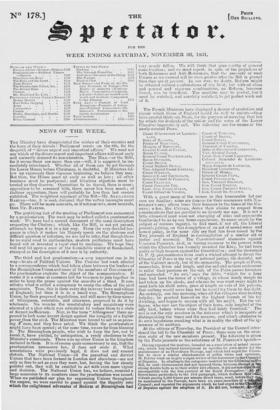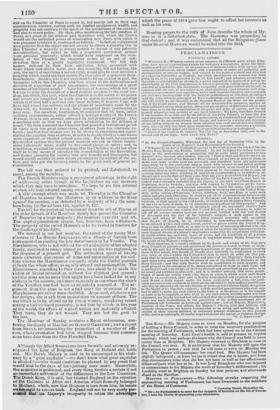The French Ministers have displayed a degree of resolution and
vigour which those of England would do well to imitate—they have created thirty-six Peers, for the purpose of carrying that law for which the demands of the nation and the votes of the Lower Chamber imperatively call. The following are the names of the newly-created Peers.
Count D'AuuussoN DE LAFEUIL• LADE,
Duke of BAssAxo, Prince of BEAuveAu, Marquis of BizEmoxr,
General Count of CESSAC, Baron CUVIER, General Count DAUTHOUARD, Baron DAVILTER, Count DROUT, Count Mathew DUMAS, Vice-Admiral Count EMERIAU, Count D'ERLON, General Count ExcimmAxs, General Count de FLAHAUT, Count FaANcAts, Count FERNAND Foy,
Lieut.-Gen. Count GAZAN, • Count Gilbert de V0ISINS, Count of TUB ENNE,
Count of BONDY,
Count BONET,
General Count CAFFAV.ELLI,
Viscount of CASSINI,
Duke of GRAMONT-CADEROUSEE,
Vice-Admiral JACOB, Lieut.-Gen. Count LAGRANGE, Colonel Alexander de LAnoctic-
FOUCAULT),
Major-General de LA-scot:as, President LEPOITEVIN, Prince of Mosx.A,
General Count PAJor„ Count PERItEGAUX, Gen. Viscount ROGNIAT, Gen. Count ROGITET, Gen. Count PHILIPPE SEGUit, Gen. Count ST. SELFICE.
With a great many of the names in this honourable list our ears are familiar ; some are famous for their connexion with N A- PoLgoN's era; others trace their honours to the times of the CA- PETS ; a few, like CUVIER, derive their claims to respect from considerations that are peculiar to no dynasty nor age. It is not a little whimsical (and were not changing of sides and arguments familiarized to us by our home experience, its cause might be the subject of curious inquiry), to find most, if not all, the Liberal journals joining, on this completion of an act of sound sense and honest policy, in the same silly cry that has been raised by the Tory journals of England in contemplation of a similar act of justice and necessity. The Con4itutionnel clamours against CASIMIR PERRIER, as if, in having recourse to the powers with which the Chamber has formally invested the King, he had been guilty of high treason against the Constitution ; and the rhetorical 0. P. Q. prognosticates from such a wicked attempt to direct the Chamber of Peers in the way of national justice, the downfal, not of the Cabinet merely, but of the monarchy. The people ofParis, meanwhile, listen and laugh, and the sad and serious endeavour to enlist their passions on the side of the Peers passes harmless and unheeded. "An owl," says the fable, "which for a long time had been the terror of a village, in whose lonely steeple he had taken up his abode, and whence he was wont every night to send forth his shrill notes, grew at length so vain of his powers, that nothing would serve him but he would try them by day-light. Accordingly, one fine morning, when all the villagers were making holyclay, he perched himself on the highest branch of his ivy dwelling, and began to scream with all his might. But the vil- lagers, who now saw the object of their fears, only laughed at the silly bird, before whose voice they had lately trembled." The owl is not the only creature in the universe which is incapable of distinguishing the times and the seasons, and which attributes to its own lugubrious croaking what is in reality the effect of the ig- norance of its auditors.
At the sittings of Thursday, the President of the Council intro- duced the bill to the Chamber of Peers : there were on the occa- sion eight of the new members present. The following is given by the Paris journals as the substance of M. PERRIER'S speech— Having repeated the motives, founded on a conviction of actual neces- sity, which had induced Government to sacrifice its own desire for the maintenance of an Hereditary Peerage, and which had urged the Cham- ber to show a similar abandonment of selfish views and opinions, M. Perrier went on to give a rapid review of the discussion in ths01aalber of Deputies. In alluding to the categories inserted by the Bill, he said—Government had not opposed them, because-,-iOlt+4 strong doubts both as to their utility and efficacy, it did notcpinittlatth incompatible with the free exercise of the Royal Prerogative:=e - ferred more particularly to the 21st paragraph, which declares VE,e, viduals paying 3,000 francs per annum direct taxes, must, before they be nominated to the Peerage, have been six years members Of a:- Council; and repeated the arguments which he had urged:intlic- of Deputies against the adoption of it. Ile did not, litkiayet; '
call on the Chamber of Peers to reject it, but merely left to their sage consideration whether, casting such an implied suspicion on wealth and property was not contrary to the spirit of the institutions of the country, and also to sound policy. He then, after mentioning the late creation of Peers, as a proof of the wisdom and discretion with which the Crown would use the unlimited power of nominating new Peers with which it was proposed to intrust it, continued as follows. "In fact, all enlightened men perceive that the object was not merely to obtain a majority (for in this Chamber a majority is always certain in favour of any patriotic determination), but rather to take a respectful precaution against your personal generosity, which would have impressed on the reso- lution of the Chamber the character rather of an act of self- deVotion than of a purely legislative enactment. We felt that names, national by their high attributes, being associated with
those which now shed a lustre over this Assembly, but not having, like you, the merit of sacrificing a vested right, would give to your decision a sanction which would not have merely the character of a generous disin- terestedness. Besides, was it not expedient to fill up, at least in part, the vacancies left in this Chamber, and thus assure to the deliberation and decision of a question of such importance, the concurrence of a great number of intelligent minds? Your feelings of honour, which last year led you to refer the decision of a most delicate question to the royal wis- dom, but which, this year, when the Charter is in the zenith of its power and action, arc compelled to guide you to decide yourselves a question which is at least half a personal one—your feelings of honour, I say, will have understood our motives, and the choice of individuals made by the Ring will, we venture to assert, have completed their justification in your eyes. For ourselves, Gentlemen, we conceive that we have, under existing circumstances, rather offered a homage worthy of the French Peerage, than in any manner outraged its independence or glory. Our conscience tells us that we have given satisfaction to the delicacy of yours." He then reminded the Chamber that powerful institutions perish at times from too great concessions, at others from too obstinate re- fusals; and that true wisdom was to be shown in examining and appre- ciating the existing state of affairs, in order to decide whether concessions were expedient, or whether refusal were safe. For hi:nself, he expressed Isis decided opinion that the present moment was one in which conces- sions judiciously made, would he the surest pledge of safety; and, in conclusion, repeated his sanguine hope that the Chamber would not allow itself to be the means of impeding the consolidation of the Revolution, and thence plunging the country into new tumults and dissensions, but -would readily sacrifice its own future privileges to the welfare of the na- tion, and thus put the finishing stroke to the great work of general re- conciliation.
The bill was then ordered to be printed, and distributed, as usual, among the members.
The French Ministers enjoy a preeminent advantage in the right of addressing either branch of the Legislature on any measure which they may have to introduce. We hope to see this rational custom ere lone- adopted among ourselves.
A silly attempt which was made on Thursday in the Chamber of Deputies to annoy the Ministers, by an address to the King against the creation, was defeated by a majority of 94 ; the num- bers being for the address 133, against it, 227.
The bill for the perpetual banishment from the soil of France of the elder branch of the Bourbon family has passed the Chamber of Deputies by a large majority ; the numbers were 251 and 69. The capital punishment clause, has, however, been withdrawn. The property of the exiled Monarch is to be vested in trustees for the discharge of his debts.
We noticed in our last number, the arrest of the young Mar- chioness of LA ROCHE JAQUELINE, on a charge of having been instrumental in exciting the late disturbances in La Vendee. The Marchioness, who is not without the wit and activity of her adopted family, contrived to escape almost as soon as she was captured, in the disguise of a peasant girl. The authorities speak of having made extensive discoveries of arms and ammunition at the cha- teau whence the Marchioness ecaped ; while the Carlist journals ridicule the whole affair, as equally absurd and contemptible. The Marchioness, according to their views, was about to be made the victim of liberal persecution, without the slightest just ground ; and the arms are no more than might have been looked for in any chateau in the country, and more especially in one where the chiefs of the VendtSan war had been so repeatedly assembled. The ar- gument from the arms is not a bad one ; the intentions of the Marchioness are rather more doubtful. At present, whatever were
designs, she is safe from molestation on account of them. The warwhich is to be stirred up by young women, wandering errant among a half-civilized peasantry, is not that by which, in this year of -the world, the affairs of a great nation are materially affected. They tease, they do not wound. They are but the gnat to the lion.
The Moniteur of Sunday contains a Royal ordonnance, con- ferring the dignity of Marshal on General GROUCHY ; and a report from SOULT, recammending the promotion of a number of offi- cers, whose promotion had been stopped because their commis- sions bore date from the One Hundred Days.



























 Previous page
Previous page